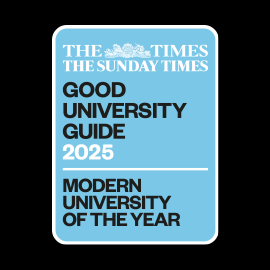-
Study
-
Quick Links
- Course Search
- Fees and Funding
- Unlock Your Potential
- Still time to Apply
- Higher and Degree Apprenticeships
- Continuing Professional Development
- Still time to apply
-
Undergraduate
- Application Guides
- UCAS Exhibitions
- Foundation Years
- School & College Outreach
- Information for Parents
-
Postgraduate
- Application Guide
- Postgraduate Research Degrees
- Flexible Learning
- Change Direction
- Register your Interest
-
-
International
International
Northumbria’s global footprint touches every continent across the world, through our global partnerships across 17 institutions in 10 countries, to our 277,000 strong alumni community and 150 recruitment partners – we prepare our students for the challenges of tomorrow. Discover more about how to join Northumbria’s global family or our partnerships.
View our Global Footprint-
Quick Links
- Course Search
- Undergraduate Study
- Postgraduate Study
- Information for Parents
- London Campus
- Northumbria Pathway
- Cost of Living
- Sign up for Information
-
International Students
- Information for Students
- International Events
- Application Guide
- Entry Requirements and Education Country Agents
- Global Offices
- English Requirements
- English Language Centre
- International student support
- Cost of Living
-
International Fees and Funding
- International Undergraduate Fees
- International Undergraduate Funding
- International Masters Fees
- International Masters Funding
- International Postgraduate Research Fees
- International Postgraduate Research Funding
-
International Partners
- Agent and Representatives Network
- Global Partnerships
- Global Community
-
International Mobility
- Information for Northumbria Students
- Information for Incoming Exchange Students
-
-
Business
Business
The world is changing faster than ever before. The future is there to be won by organisations who find ways to turn today's possibilities into tomorrows competitive edge. In a connected world, collaboration can be the key to success.
More on our Business Services -
Research
Research
Northumbria is a research-rich, business-focused, professional university with a global reputation for academic quality. We conduct ground-breaking research that is responsive to the science & technology, health & well being, economic and social and arts & cultural needs for the communities
Discover more about our Research -
About Us
-
About Northumbria
- Our Strategy
- Our Staff
- Place and Partnerships
- Leadership & Governance
- Academic Departments
- University Services
- History of Northumbria
- Contact us
- Online Shop
-
-
Alumni
Alumni
Northumbria University is renowned for the calibre of its business-ready graduates. Our alumni network has over 246,000 graduates based in 178 countries worldwide in a range of sectors, our alumni are making a real impact on the world.
Our Alumni - Work For Us
What will I learn on this module?
The enhanced perioperative practice module will allow you the opportunity to explore the core phases of working in the operating department. The component phases are anaesthetics, surgery, and post-anaesthetic care, which will allow for a refreshed overview of the professional regulations, guidelines and policies related to general perioperative practice. By integrating a focussed presentation and written reflection, this allows flexibility within the summative assessment, meaning learning and development can be bespoke to your individual requirements. This summative assessment is designed to allow for presentation of learning outcomes, meaning your poster presentation and written reflection can be used to feedback to your clinical environment and be used for HCPC professional declaration or NMC Revalidation.
There will be a group of specialist educators delivering your sessions, specialising in either anaesthetics, surgery, or post-anaesthetic care. These focussed lectures and seminars will give a useful overview of perioperative practice and allow topical debate on contemporary issues within each perioperative phase. Due to specialist educators delivering these sessions, you will be provided with novel and interesting clinical and workforce theories, alongside contemporary research evidence related to each component phase.
Due to the wide educational remit of this module, previous knowledge of perioperative practice is strongly recommended, however, should this not be the case, your Module Leader will be able to provide a structured and functional learning plan whilst undertaking this module.
How will I learn on this module?
The module provides a range of learning and teaching opportunities including face to face and online lectures, workshops, case-based discussion, and e-learning via Blackboard Ultra. Blackboard Ultra is the Technology Enhanced Learning (TEL) system used within the University and supports learning away from the classroom. It will be available to you throughout the module and your programme of study. Blackboard Ultra provides access to a range of module materials including e-learning packages and materials available for you to consider in advance of, or as part of attending a taught session (flipped classroom). Using Blackboard Ultra will improve your technological skills enabling flexible, enquiry-based learning and opportunity to undertake learning in your own time. This teaching and learning strategy forms part of the University blended learning approach and will allow a degree of flexibility in your educational pursuit.
During this module, there may be opportunity to engage with the university’s state of the art Clinical Skills Centre to help you develop and refresh your practical skills through case-based discussion activities. Your lectures will be held to identify key guidelines and research evidence which undergirds professional perioperative practice across the three phases of care. Interactive seminars will be used to debate your clinical perspectives, related to the available evidence with a focus towards developing a summative assessment topic. Through sharing your clinical experiences, you offer the opportunity for effective cross fertilisation of ideas with other members of the module group. There will be opportunity for you to reflect and review your progress with the module team, with peer discussion and with the Module Leader (ML).
How will I be supported academically on this module?
A Module Leader (ML) will be available to you for the duration of the module and will have the same professional background as you. You will have “one to one” or group tutorial support for your academic assessment. Your ML will be available to review and explore your progress, having both an academic and student welfare role. Your ML can support your academic learning journey referring you to additional services if needed.
There are comprehensive Skills Plus online learning materials available online within the library that provide you with a range of information about academic study. Peer support is available from your student group and there are opportunities for discussion and sharing learning experiences with your peers in the classroom and using Blackboard Ultra. Blackboard Ultra will support your leaning away from the classroom and it will be available to you throughout the programme. It will contain a number of resources such as eLearning packages and presentations to support your learning and development on the module giving you quick access to module information so you can stay updated. The opportunity to draw on others i.e., peer experiences, presents a positive learning opportunity for students. There are a range of central Student Support and Wellbeing Services “Student Central” operating from Northumbria University Library is on the ground floor at Coach Lane Campus (East). Student Central operating from City Campus (West) is also located in the library on the ground floor. This is available to support you around university academic processes for example, registering a change of circumstances, counselling and mental health support or disability and dyslexia support. The library is open outside of formal scheduled teaching hours and there are student hub areas with access to technology available at Coach Lane and City Campus. Your clinical practice areas may also have active library facilities that you can use.
What will I be expected to read on this module?
All modules at Northumbria include a range of reading materials that students are expected to engage with. Online reading lists (provided after enrolment) give you access to your reading material for your modules. The Library works in partnership with your module tutors to ensure you have access to the material that you need.
What will I be expected to achieve?
Knowledge & Understanding:
1. Identify component aspects of the perioperative patient journey and their relevance to patient outcomes
2. Explain the purpose of key concepts and theories within phases of perioperative care, offering critique where appropriate
Intellectual / Professional skills & abilities:
3. Evaluate current processes and approaches within perioperative care and link their usage to appropriate literature and guidelines
4. Using valid evidence sources, devise and sustain reflective debate on your chosen phase of the perioperative journey
Personal Values Attributes (Global / Cultural awareness, Ethics, Curiosity) (PVA):
5. Justify your analysis and methods, linked to self-directed evidence collection and presentation content and design
How will I be assessed?
Formative: Mid-module presentation of proposed summative assessment issue. The presentation can undergo staff/student review and constructive feedback can be gained.
Summative: Choose a clinically appropriate issue, related to ONE of the three perioperative phases (anaesthetics, surgery or post-anaesthetic care). This will be via anonymous submission.
• Electronic poster submission (e-poster – 1,000-word maximum) (25% weighting) (MLO 3 and 5)
• 1500-word critical reflection of your chosen issue relating to anaesthetics, surgery or post-anaesthetic care (75% weighting) (MLO 1, 2, 4 and 5)
Pre-requisite(s)
“ To undertake this module you must hold a valid current professional registration” (i.e.: NMC / GMC / HCPC)
Co-requisite(s)
N/A
Module abstract
This module addresses areas of clinical significance within anaesthetics, surgery, and post-anaesthetic care. Anaesthetic and surgical themes include paediatric services, cardiothoracic, neurosurgical and obstetric anaesthesia, technology-enhanced surgery, minimally invasive procedures and service-user/co-construction. Additional topics include enhanced patient assessment, acute interventions during post-anaesthetic care and contemporary perioperative issues. A combination of lectures, seminars and practical sessions will be utilised to address the module learning outcomes.
The summative assessment plan within this module will allow a bespoke and flexible learning plan. By identifying an appropriate clinical issue of your choice, completing an e-poster and written reflection you will be able to feedback this learning to your department, while also using this assessment for HCPC professional declaration or NMC Revalidation.
Assisted by research active educators, you will be supported in the development of your academic activity as well as your clinical skills during this module.
Course info
Credits 20
Level of Study Undergraduate
Mode of Study 3 years Part Time
Location City Campus, Northumbria University
City Newcastle
Start September 2025
All information is accurate at the time of sharing.
Full time Courses are primarily delivered via on-campus face to face learning but could include elements of online learning. Most courses run as planned and as promoted on our website and via our marketing materials, but if there are any substantial changes (as determined by the Competition and Markets Authority) to a course or there is the potential that course may be withdrawn, we will notify all affected applicants as soon as possible with advice and guidance regarding their options. It is also important to be aware that optional modules listed on course pages may be subject to change depending on uptake numbers each year.
Contact time is subject to increase or decrease in line with possible restrictions imposed by the government or the University in the interest of maintaining the health and safety and wellbeing of students, staff, and visitors if this is deemed necessary in future.
Useful Links
Find out about our distinctive approach at
www.northumbria.ac.uk/exp
Admissions Terms and Conditions
northumbria.ac.uk/terms
Fees and Funding
northumbria.ac.uk/fees
Admissions Policy
northumbria.ac.uk/adpolicy
Admissions Complaints Policy
northumbria.ac.uk/complaints










